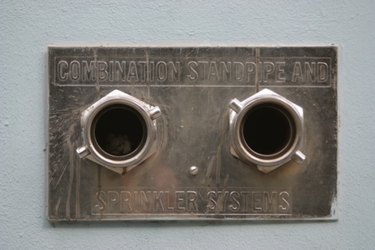
Both brass and copper are found in a wide variety of applications around the house, but both metals are subject to corrosion. Although brass and copper are similar in many ways, the metals have some substantial differences when it comes to corrosion. The way the metals corrode and how to deal with that corrosion could affect whether you decide to use copper or brass fittings around the house.
Copper Basics
Video of the Day
Copper is an element, like iron or lead. Its properties include high electrical and thermal conductivity, as well as lightness and malleability. Those features enable copper to be used in a wide variety of household applications, such as electrical wiring, plumbing, roofing and cooking. Exposure to the open air and moisture causes copper to corrode, though very slowly compared to rusting iron. The metal takes on a dull tarnish before gradually turning first black and then to the familiar green.
Video of the Day
Brass Basics
Brass is an alloy, or a mixture of metals, and most of the time it is composed of copper and zinc. As a rule, brass has a more gold-like coloring than copper and is even more corrosion-resistant, while retaining copper's malleability. As a result, it is often seen around the house in plumbing and decorative fittings, as well as in musical instruments. Another brass alloy includes aluminum in the mix, which greatly improves the metal's resistance to corrosion.
Corrosion Prevention
A variety of organic and inorganic inhibitors on the market prevent copper corrosion. These inhibitors form a barrier between the copper and the corrosion-inducing environment; the main difference between them is that organic inhibitors eventually break down. The same inhibitors work just as well to prevent brass corrosion. Brass alloys with aluminum form a self-renewing layer of aluminum oxide, which serves as a built-in inhibitor. With a little polishing, aluminum brass should not corrode at all.
Corrosion Removal
Once copper or brass has become corroded, the only remedy for either metal is to clean the corrosion off the surface, return it to a pristine state and seek to prevent further corrosion in the future. The simplest method for both brass and copper is to immerse it in vinegar and let the mild acids dissolve the corrosion off the metal's surface. Beyond that, a variety of polishes and cleansers on the market are applicable to both copper and brass.